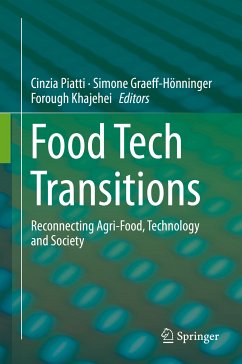Technological innovation has been one of the driving forces behind all major shifts in production and consumption patterns. The food industry, predicated on technology and continuous innovation, is now entering a transition age, as scientific advancements restructure what people eat and how people think about food. The editors of Food Tech Transitions provide a critical analysis of food technology and its impact, including the disruption potential of production and consumption logic, nutrition patterns, agronomic practices, and the human, environmental and animal ethics that are associated with technological change.
The book is designed to integrate knowledge about food technology within the social sciences and a wider social perspective. Starting with an introductory section, which provides an overview of the technological and ecological changes currently shaping the food industry and society at large, the book tackles recent advancements in food processing, preserving, distributing and meal creation through the lens of wider social issues, while also analyzing the implications and challenges brought on by rapid change.
Section 1 provides an overview of the changes in the industry and its (often uneven) advancements, as well as related social, ecological and political issues. Section 2 addresses the more subtle sociological questions around production and consumption through case-studies. Section 3 embraces a more agronomic and wider agricultural perspective, questioning the suitability and adaptation of existing plants and resources for novel food technologies. Section 4 investigates nutrition-related issues stemming from altered dietary patterns. Finally, Section 5 addresses ethical questions related to food technology and the sustainability imperative in its tripartite form (social, environmental and economic).
The editors have designed the book as an interdisciplinary tool foracademics and policymakers working in the food sciences and agronomy, as well as other related disciplines.
Dieser Download kann aus rechtlichen Gründen nur mit Rechnungsadresse in A, B, BG, CY, CZ, D, DK, EW, E, FIN, F, GR, HR, H, IRL, I, LT, L, LR, M, NL, PL, P, R, S, SLO, SK ausgeliefert werden.









